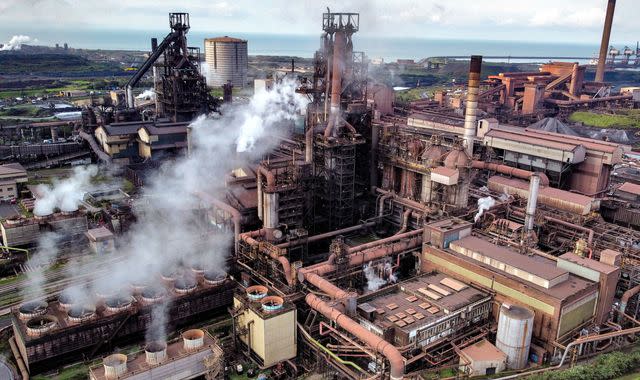Closure of Port Talbot steelworks 'will completely smash community to pieces'

"It will completely smash the community to pieces".
In the shadow of the Port Talbot steelworks, the Taibach rugby club stands.
Inside at a table, a group of workers and union reps sip cokes and beers.
The mood is jovial, they've worked alongside each other for decades now.
Each would describe their colleague as "family".
But smiles drop from faces, and the atmosphere shifts when the subject turns to the 2,800 potential job cuts at Tata Steel.
Alan Coombs says it will "devastate" Port Talbot with younger generations "moving out of the area to live... because the opportunities are not going to be here".
The steelworks' workforce currently makes up 12% of the coastal town's population.
It's "the beating heart", it's "in our blood", workers have told me all day.
Read more:
Analysis: UK needs an industrial strategy - not just piecemeal funding
Steel rescue package could be 'missed opportunity'
Closure 'will completely smash community to pieces'
Alun Davies, a union rep, says the closure of the blast furnaces "will completely smash the community to pieces".
"Some of youngsters in there, they have kids. All they want is to feed their family and that has been taken away from them," he tells me.
All day outside the steelworks, the iconic blast furnaces have belched out steam. Curling ringlets rising into the ice-blue sky.
The feeling towards Tata Steel management isn't much warmer.
'What will we do?'
There's recognition amongst all that the industry must become greener, but they insist this isn't the way.
"What will we do?" one man asks walking by, as all around passing traffic beep their horns in solidarity.
As the day has worn on the number of photographers and reporters has steadily grown.
Amid the small groups of journalists scattered outside the gates to the steelworks another worker, Gary, looks wistfully at the site.
As we film, he tells me his son, nephew and daughter's partner all work here.
He himself has had a job at this site for 37 years.
"It's in our veins. We know nothing else."
'The end of a way of life'
For many of these workers, it's all they've ever known, and it's seen through generations of their family.
All that may be about to change.
But the strength of feeling here is the common thread.
Not one person I speak to is ready to accept this without a fight.
"It's the end of a way of life if they get their way," Gary says, saying strike action is a possibility.
"We will not accept it... It would be the death of my community."


